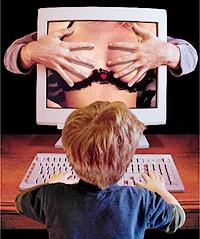
(http://www.guardian.co.uk/science/blog/2009/jun/22/end-science-unified-theory-mavericks)
Physicists only really understand 4% of the universe's constituents – the rest is mysterious dark energy and dark matter (represented here in purple, flanking the Bullet colliding galaxy clusters). Photograph: AP
Wired magazine is well known for its catchy cover lines. I won't forget one from 2007. Alongside a mocked-up image of a yellowing lab notebook and magnifying lens, it proclaimed: "The end of science: The quest for science used to begin with grand theories; now it begins with massive amounts of data."
Scientists and science commentators often say that if yesterday's science needed outstanding individuals such as Darwin and Einstein, tomorrow's theories will be shaped by the vast quantities of data pouring forth from networked computers and from the labours of big research teams working in areas such as particle physics, the human genome and astronomy.
The End of Science was also the title of a book published in 1996 by science writer John Horgan, though Horgan thought the pursuit of science was coming to an end for different reasons. He claimed that the basic scaffolding of the natural world is now mostly understood – the big bang theory, the structure of DNA and evolution by natural selection and the periodic table of elements are not going to change. Yes, many refinements are needed in our understanding of how things work, but as we are closer to reality in so many fields, the chances of seeing revolutionary new thinking will be that much less.
Will we never witness a scientific revolution again? And will tomorrow's theories be guided by big data rather than revolutionary ideas?
I recently put these questions to particle physicist Alison Wright, chief editor of the journal Nature Physics and to Lewis Wolpert, pioneering biologist from University College London, when I chaired a debate on the future of science.
Lewis's view is that fundamental biology is now unlikely to throw up any new surprises: there is much we don't know, but the fundamental architecture won't change. Alison takes a similar view for physics and says that we shouldn't expect any new shocks to the system, though, unlike Lewis, she recognises that you can never say never.
I'm with Alison on this – something tells me that physics has the potential to take off in directions that we cannot predict. Many physicists would like to see a single theory explain all of the fundamental forces of nature, or at the very least see experimental verification of the Standard Model of particle physics.
There are good reasons for this. Unification in physics has a long history – electricity and magnetism were unified in the 1800s, and later mass and energy were found to be interchangeable. In the latter half of the 20th century, two further forces were unified: electromagnetism and the "weak" force. But for the past 30 years, experimental verification of theory in physics has been more limited. This may well be because scientists have lacked the right equipment – results from the Large Hadron Collider at Cern could break the logjam.
But you do see something similar going on in physicists' attempts to unpack the composition of the universe. According to the big bang model, our universe is made up of around 4% of normal (atomic) matter; 22% dark matter and 74% dark energy. Some research groups claim to have found a signature for dark matter – but their results have not been corroborated by others. As for the idea of dark energy, Alison describes it as a "sticking plaster" that masks the fact that we don't really know what it represents.
But if we assume for a minute that physics holds the potential for a revolution in thinking, would we be able to see one coming?
Revolutions in scientific thinking are always difficult – but perhaps one reason why we may see fewer of them in the future is because of the highly professional way in which modern science is organised. It takes a lot of courage to challenge conventionally accepted views, and it needs a certain amount of stamina to constantly battle those who want to protect the status quo. Mavericks do not do well in large organisations, which is what some scientific fields have become.
Progress in science needs researchers who are not afraid – or who are encouraged and rewarded – to ask awkward and difficult questions of theory and of new data. It is easier to question mainstream views if you are independently wealthy, as many scientists in previous ages tended to be. But I wonder how many of us would do so if we were employed by the state and our career progression depended on the validation of our peers?
Ehsan Masood is a science writer and chaired Nature's Big Science Debate on the future of physics and biology, which took place on 8 June











